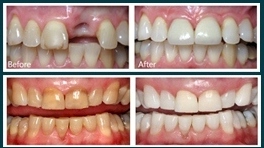Inside of each of your teeth is a pulp chamber in which can be found the blood vessels, nerves, and connective tissue that help the roots of your teeth grow during development. When the pulp in this chamber becomes infected – known as an abscess tooth – it becomes necessary to remove the infection in order to prevent tooth loss and other potentially serious consequences. The procedure to remove infection is known as root canal therapy or, more commonly, a root canal, and it is a safe, effective, and quick way to preserve the quality and appearance of your smile.
• Throbbing toothache
• Pain when chewing or biting
• Heightened sensitivity to heat and cold
• Persistent bad breath
• Swelling of lymph nodes in the neck
• Facial swelling
• Fever
If you are experiencing any of these symptoms, you likely have an abscessed tooth. Left untreated, the infection can spread to the jaw and throughout the face, resulting in systemic infection. An untreated tooth abscess can also result in tooth loss, necessitating advanced restorative services to preserve the quality and function of the smile.



